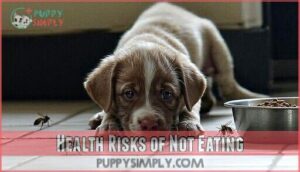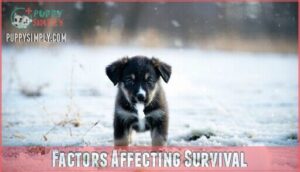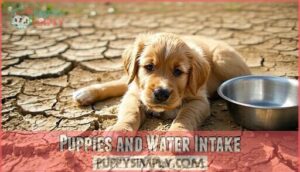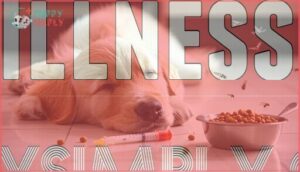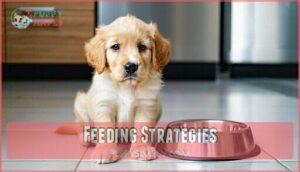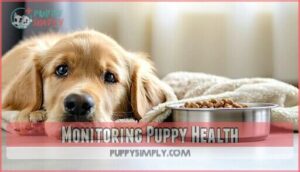This site is supported by our readers. We may earn a commission, at no cost to you, if you purchase through links.
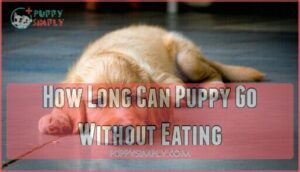 Your puppy shouldn’t go more than 12-24 hours without eating, but younger pups face much tighter deadlines.
Your puppy shouldn’t go more than 12-24 hours without eating, but younger pups face much tighter deadlines.
Puppies under 8 weeks old can develop serious problems after just 6-8 hours without food, since their tiny bodies burn through energy like a race car burns fuel.
Older puppies might handle a day, but you shouldn’t test those limits, as age matters tremendously—newborns are basically running on fumes much faster than their grown-up siblings.
A skipped breakfast might seem harmless, but it can quickly snowball into a vet emergency, and the key lies in understanding exactly what factors determine your pup’s survival timeline.
Table Of Contents
- Key Takeaways
- Puppy Eating Habits
- How Long Can Puppy Go Without Eating
- Age and Survival
- Health Risks of Not Eating
- Factors Affecting Survival
- Puppies and Water Intake
- Reasons for Not Eating
- Getting Puppy to Eat
- Monitoring Puppy Health
- Emergency Care for Puppies
- Frequently Asked Questions (FAQs)
- How long can a dog go without food?
- Can a dog go without food?
- How long if a dog stops eating?
- How long can a dog go without eating water?
- Can puppies go overnight without eating?
- What happens if a puppy doesn’t eat for 24 hours?
- How long can puppies go between feedings?
- What types of food should I feed my puppy?
- What foods should I avoid feeding my puppy?
- How often should I feed my puppy?
- Conclusion
Key Takeaways
- Puppies under 8 weeks need food every 2-6 hours; older puppies can go 5-7 hours, but skipping meals risks serious health issues.
- Dehydration is more urgent than hunger; puppies can’t go more than 24 hours without water before facing severe complications.
- Appetite loss can signal illness, stress, pain, or picky eating; act quickly to identify the cause and consult your vet if needed to prevent appetite loss.
- Monitor your puppy’s eating, hydration, and behavior closely; skipping meals for more than 12-24 hours requires immediate veterinary attention.
Puppy Eating Habits
You’ll notice your puppy’s eating habits change dramatically as they grow, with newborns needing food every 2 hours while older puppies can wait 4-6 hours between meals.
Understanding these natural feeding patterns helps you recognize when your puppy’s appetite signals normal development or potential health concerns.
Normal Eating Schedule
Your puppy’s feeding frequency depends on their age and size.
Consistent routine helps establish healthy eating patterns and prevents puppy appetite loss.
Key puppy feeding schedule guidelines:
- Newborns to 3 weeks: Feed every 2 hours around the clock for proper growth
- 4-7 weeks old: Scheduled meals every 4-5 hours with portion control adjustments
- 8+ weeks: Three daily meal times work best for most puppies
Factors Affecting Appetite
Several factors can trigger puppy appetite loss, making mealtimes challenging for concerned owners.
Underlying illnesses like infections or parasites often cause sudden food refusal. Medication side-effects from antibiotics or pain relievers may reduce hunger.
Environmental changes such as moving homes create puppy stress. Dental problems make chewing painful, while individual food preferences affect eating habits.
Recognizing these puppy health concerns helps address appetite issues promptly. Boredom can also contribute, sometimes leading to ingestion of inedible items, which may be a sign of underlying behavioral issues.
Signs of Hunger
Recognizing puppy hunger signs helps prevent feeding delays that could impact your pet’s health.
Watch for vocalization cues like whining or barking near meal times. Restlessness and pacing around the kitchen indicate appetite.
An empty bowl getting nudged or carried signals mealtime requests. Begging behavior includes pawing, staring, or following you around.
Increased sniffing near food areas shows your puppy’s seeking nutrition when experiencing genuine hunger.
How Long Can Puppy Go Without Eating
Understanding your puppy’s starvation timeline becomes essential when they refuse meals.
Puppies can survive three to five days without food if they maintain access to water, but this doesn’t mean you should wait that long.
Your puppy’s survival isn’t about how long they can go without food—it’s about how quickly you act when they won’t eat.
Puppy metabolism runs much faster than adult dogs, making them vulnerable to hypoglycemia and dehydration within hours.
Here’s what you need to know about puppy starvation risks:
- 12 hours without eating requires immediate veterinary intervention
- Puppy hypoglycemia can develop within 24 hours of food refusal
- Breed differences affect survival – smaller breeds face greater risks
- Long-term effects include developmental delays and organ damage
When your puppy not eating extends beyond normal meal-skipping, their body begins breaking down muscle tissue for energy.
This process accelerates faster in puppies than adults due to their rapid growth requirements and higher metabolic demands, making prompt veterinary intervention essential.
Age and Survival
Your puppy’s age directly determines how long they can safely go without food, with younger puppies facing much greater risks than older ones.
Newborns need feeding every two hours, while puppies over eight weeks can handle longer periods between meals without immediate danger, and it’s crucial to understand these complete concepts to ensure their safety.
Newborn Puppies
Age becomes the most critical factor when determining survival time.
Newborn puppy feeding requires round-the-clock attention since these vulnerable babies can’t survive beyond 24-48 hours without nutrition.
How long puppy survival lasts depends on colostrum benefits received initially.
Without proper neonatal care, puppy hypoglycemia develops rapidly.
Maternal neglect during early development stages leads to puppy starvation and potential death within hours.
Puppies require consistent meals due to their rapid growth needs.
4. 8 Week Old Puppies
Puppies between four and eight weeks gradually shift from their mother’s milk to solid food, typically surviving 5-6 hours without eating.
This weaning timeline coincides with vital socialization impact and vaccination schedule preparations. Your puppy’s nutritional needs evolve rapidly during this period.
Smaller breeds, however, may require more frequent feeding due to their faster metabolisms.
Critical feeding considerations include:
- Every 4-5 hours – Maximum safe interval between meals
- Gradual food introduction – Mix puppy kibble with warm water
- Monitor weight loss – Any decline requires immediate attention
- Parasite prevention – Affects appetite and nutrient absorption
Puppies Over 8 Weeks
Once your puppy hits 8 weeks, feeding frequency drops to 3-4 meals daily.
These growing bundles of energy can handle 6-7 hours between meals, but don’t push it. Growth spurts and activity levels affect puppy nutrition needs substantially.
| Age Range | Maximum Safe Hours |
|---|---|
| 8-12 weeks | 6-7 hours |
| 3-6 months | 8-10 hours |
| 6+ months | 10-12 hours |
| Adult dogs | 12+ hours |
Training treats shouldn’t replace proper puppy food and kibble choices matter for developing appetites; remember to consult a newborn puppy feeding chart for detailed guidelines.
Health Risks of Not Eating
When your puppy doesn’t eat, serious health problems can develop within hours rather than days.
You’ll need to understand these risks to protect your puppy’s health and recognize when immediate veterinary care becomes necessary.
Dehydration
Dehydration hits puppies harder than missing puppy food.
Thirst kills faster than hunger—your puppy’s survival depends on water, not just food.
When your pup stops eating, they’re also likely drinking less water, creating a dangerous cycle.
Poor water absorption leads to electrolyte imbalance and compromised kidney function within hours.
Watch for sticky gums, lethargy, and sunken eyes.
Dehydration prevention requires immediate attention—fluid therapy may be necessary to restore proper puppy nutritional needs and prevent organ damage.
Malnutrition
Nutritional deficiencies hit fast when your puppy stops eating.
Within days, you’ll notice muscle wasting and weight loss as their body burns through energy reserves.
Growth stunting becomes a real concern, especially in developing pups.
Their immune system weakens, leaving them vulnerable to infections.
Without proper puppy nutritional needs being met, serious complications arise quickly, making puppy food refusal a critical emergency.
Organ Damage
Beyond malnutrition’s immediate effects, organ damage becomes your puppy’s next serious threat.
Prolonged fasting triggers devastating changes throughout their tiny body systems.
Critical organ damage from puppy food refusal includes:
- Liver shrinkage and thyroid atrophy affecting metabolism
- Stomach ulcers causing internal bleeding and pain
- Muscle breakdown weakening heart function
Immune weakening follows quickly, making recovery harder with each passing hour.
Factors Affecting Survival
Your puppy’s survival time without food depends on several key factors that you can’t ignore.
A small breed puppy won’t last as long as a large breed, while an active puppy burns energy faster than one that’s confined.
Cold weather puts additional stress on a starving puppy’s body, making survival time even more unpredictable.
Breed Size
Size matters in regards to puppy feeding concerns and survival times.
Small breeds face greater puppy health risks due to faster metabolism rates, while large breeds can endure longer without food.
Understanding these breed differences helps address puppy appetite issues and nutritional needs effectively.
| Breed Size | Survival Time | Feeding Frequency |
|---|---|---|
| Small Breeds | 12-24 hours | Every 3-4 hours |
| Medium Breeds | 24-36 hours | 3-4 times daily |
| Large Breeds | 48-72 hours | 2-3 times daily |
| Toy Breeds | 12-18 hours | Every 2-3 hours |
| Giant Breeds | 48-96 hours | 2-3 times daily |
Activity Level
Your puppy’s activity level directly impacts their energy expenditure and calorie needs.
Highly active or working puppies burn through energy reserves faster than couch potatoes, making them more vulnerable when they skip meals.
Exercise impact varies by breed differences too – a Border Collie puppy needs more frequent puppy feeding than a Bulldog.
Monitor your pup’s puppy appetite closely, especially after increased activity, as proper puppy care means matching food intake to their energy output for ideal puppy health and ensuring they receive the right amount of energy output.
Weather Conditions
Cold weather puts extra stress on your puppy’s body, making them burn more calories to stay warm.
Without shelter access, they’ll weaken faster during winter months. Hot weather increases puppy dehydration risks, especially when combined with not eating.
Weather stress affects how long puppies survive without food. Environmental factors like temperature extremes reduce their resilience substantially, and weather stress is a critical factor, making puppy dehydration a significant concern.
Puppies and Water Intake
While puppies can survive several days without food, they can’t last more than 24 hours without water before facing serious health risks.
You’ll need to monitor your puppy’s water intake closely, as dehydration develops faster than starvation and requires immediate veterinary attention, which is a critical aspect of their health.
Importance of Hydration
Water keeps your puppy’s organs functioning properly and maintains essential electrolyte balance.
Unlike food, dehydration happens fast—within hours.
Your puppy’s kidneys, heart, and brain depend on adequate hydration to work correctly.
Proper puppy water intake prevents serious puppy feeding concerns and supports healthy development.
When addressing puppy feeding issues, remember that hydration methods are just as important as nutrition for survival, and proper water intake is crucial for healthy development.
Signs of Dehydration
Dehydration sneaks up fast when your puppy refuses food.
Check skin elasticity by gently pinching the scruff – it should snap back instantly.
Dry, sticky gums signal trouble, as do sunken eyes and lethargy signs.
Dark yellow urine indicates serious dehydration requiring immediate veterinary advice.
These dog dehydration signs mean your puppy needs professional puppy vet care for underlying puppy illnesses causing feeding concerns, including serious dehydration, immediate veterinary advice, and underlying puppy illnesses.
Encouraging Water Intake
Making water more appealing can boost your puppy’s hydration levels substantially.
Try adding low-sodium broth ice cubes to their bowl for extra flavor.
A water fountain appeal often works better than static bowls since puppies enjoy moving water.
Wet food benefits include increased moisture intake, while monitoring water palatability guarantees your puppy stays properly hydrated through consistent puppy feeding tips.
Puppies, like adult dogs, require about one ounce per pound of body weight daily, which can be found at one ounce per pound.
Reasons for Not Eating
When your puppy suddenly refuses food, you’ll need to identify the underlying cause to address the problem effectively.
Several factors can trigger appetite loss, including illness, stress from environmental changes, physical pain, or simply being a finicky eater who’s developed preferences for certain foods.
Illness
Illness triggers rapid appetite loss in puppies, creating dangerous health risks within hours.
When your puppy suddenly refuses food, underlying conditions might be disrupting their natural hunger signals, making immediate attention vital.
Common illness-related causes include:
- Parasitic infections – Worms and intestinal parasites cause digestive issues and nausea
- Dental problems – Painful teeth or gums make eating uncomfortable
- Medication effects – Treatments can suppress appetite temporarily
Veterinary consultation becomes essential when sick dogs experience prolonged puppy food strikes.
Stress
Stress triggers can turn mealtime into a puppy food strike.
Environmental stress from loud noises, separation anxiety when you’re away, or socialization stress with new people disrupts eating patterns. Training stress during housebreaking creates feeding challenges too.
Your puppy’s skipped meal might signal emotional overwhelm rather than physical illness. It’s also important to note that anxiety can reduce water intake.
| Stress Type | Common Signs |
|---|---|
| Separation Anxiety | Whining, pacing when alone |
| Environmental Stress | Hiding from loud sounds |
| Socialization Stress | Cowering around strangers |
| Training Stress | Refusing treats during lessons |
| Schedule Changes | Disrupted eating patterns |
Pain
Physical discomfort can silence your puppy’s appetite faster than you’d expect.
When pain signals overwhelm their system, eating becomes secondary to finding relief.
Puppy discomfort from teething, digestive pain, or chronic pain creates puppy feeding challenges that require immediate attention.
Pain-related appetite loss indicators:
- Whimpering or reluctance when approaching food bowls
- Favoring one side while eating or drinking
- Decreased energy combined with prolonged decreased appetite
- Changes in puppy eating habits like slower chewing or stopping mid-meal
Pain management directly impacts appetite stimulation success.
Finicky Eating
Some puppies develop picky eating habits that aren’t related to health issues.
Your puppy might turn their nose up at kibble while begging for treats. Food preferences often stem from inconsistent feeding routines or too many snacks between meals.
| Behavioral Causes | Environmental Factors | Solutions |
|---|---|---|
| Treat overload disrupts appetite | Distracting feeding location | Establish consistent feeding routine |
| Begging reinforces fussy eating | Multiple food bowls confuse | Remove treats 2 hours before meals |
| Attention-seeking behavior | Noisy environment during meals | Create quiet feeding space |
| Learned pickiness from owners | Temperature affects food appeal | Warm food slightly to enhance aroma |
Puppy feeding challenges often resolve when you address these puppy feeding habits consistently.
Getting Puppy to Eat
When your puppy refuses to eat, you’ll need proven strategies to encourage healthy eating habits and prevent dangerous weight loss.
Simple techniques like warming their food, hand-feeding, or mixing in appealing flavors can stimulate their appetite and get them back on track with healthy eating habits.
Appetite Stimulants
When your puppy won’t eat, medication options like prescription appetite stimulants can help.
Entyce, an FDA-approved treatment, targets hunger receptors effectively.
Natural remedies including probiotics and omega-3s offer gentler approaches.
If you’re seeking further options, consider exploring a puppy appetite stimulant.
However, supplement safety requires veterinary guidance before trying palatability enhancers.
These puppy appetite solutions address puppy hunger issues, but proper diagnosis prevents complications when your puppy’s not eating.
Feeding Strategies
Beyond basic meal times, smart feeding strategies can make all the difference in your puppy’s eating habits.
Establishing consistent feeding routines helps regulate their appetite naturally. One option is to try delicious puppy food broth.
- Consistent Schedule: Feed at the same times daily to build reliable eating patterns
- Food Presentation: Warm kibble with broth or mix wet food for enhanced appeal
- Dietary Changes: Introduce new foods gradually over 7-10 days to avoid stomach upset
- Professional Guidance: Consult your vet for personalized puppy feeding recommendations and strategies
Hand-Feeding
Sometimes coaxing becomes necessary when standard feeding techniques fail.
Hand-feeding offers direct encouragement and builds trust between you and your puppy.
Use clean hands to maintain proper hygiene during this process.
Gently place small food portions near their mouth, allowing natural licking responses.
This method provides benefits like increased bonding while addressing feeding challenges.
Consider specialized products for puppy hand feeding to assist with the process.
Avoid syringe-feeding or force-feeding unless veterinarian-directed.
Monitoring Puppy Health
You can’t rely on guesswork regarding your puppy’s eating habits – tracking their food intake daily helps you spot problems before they become serious health issues.
If your puppy skips more than two meals or shows signs like lethargy, weight loss, or dehydration, you’ll need to contact your veterinarian within 12 to 24 hours, which is a critical step to address potential health issues.
Tracking Food Intake
Keeping detailed records helps you spot patterns in your puppy’s eating habits.
Document meal times, portion sizes, and how much they actually consume.
This puppy feeding guide approach reveals whether appetite changes signal health issues.
- Daily food logs – Record exact amounts offered versus consumed at each meal
- Weight tracking – Monitor weekly weight changes to confirm proper growth
- Behavioral notes – Note energy levels, mood, and activity after meals
Recognizing Health Issues
Health warning signs appear before serious complications develop.
Watch for lethargy signs like excessive sleeping or reluctance to play.
Behavioral changes include hiding, whimpering, or unusual aggression.
Nutritional deficiencies manifest through dull coat, weakness, or stunted puppy growth.
Hypoglycemia risk increases with trembling or confusion.
Immune weakening makes your puppy susceptible to infections.
| Physical Signs | Behavioral Changes | Serious Symptoms |
|---|---|---|
| Dull, brittle coat | Excessive hiding | Trembling or shaking |
| Weight loss visible | Reduced playfulness | Confusion or disorientation |
| Pale gums | Whimpering frequently | Difficulty standing |
| Sunken eyes | Aggressive behavior | Labored breathing |
| Weak muscle tone | Social withdrawal | Unresponsive to stimuli |
Seeking Veterinary Care
Call your vet immediately if your puppy refuses food for 12 hours or shows emergency signs like lethargy or vomiting.
Professional diets and supplement guidance require veterinary assistance to avoid puppy feeding complications.
Proactive monitoring helps catch puppy feeding problems early.
Don’t wait when puppy feeding warnings appear – quick vet consultation prevents serious puppy feeding precautions from becoming emergencies.
Quick action is essential when puppy feeding problems arise, as it can prevent minor issues from escalating into major health concerns.
Emergency Care for Puppies
When your puppy stops eating for more than 12 hours, you’re facing a potential emergency that requires immediate veterinary attention.
You’ll need to recognize critical warning signs like lethargy, vomiting, or weakness and take swift action to prevent serious health complications.
Signs of Distress
When your puppy stops eating, watch for these red flags that signal trouble.
Early detection can mean the difference between a minor hiccup and a serious health crisis.
Critical warning signs include:
- Lethargy Signs – Your normally playful pup becomes unusually tired, unresponsive, or won’t engage with favorite toys
- Behavioral Changes – Hiding, excessive whining, or sudden aggression can indicate pain signals or distress from puppy fasting complications
- Physical Weakness Indicators – Stumbling, trembling, or difficulty standing suggests puppy nutritional deficiencies are taking hold
Immediate Action
When your puppy won’t eat, assess the situation immediately by checking for obvious illness signs.
Contact your veterinarian within 12-24 hours of food refusal.
Provide emergency hydration through small water sips or ice cubes.
Monitor symptoms like lethargy, vomiting, or weight loss.
Take preventative measures by documenting skipped puppy meals and addressing puppy feeding difficulties before they escalate into serious puppy feeding dangers.
Preventing Future Issues
Prevention beats crisis every time.
Establish consistent puppy meal times following proper puppy feeding guidelines to avoid future emergencies.
Regular checkups enable early intervention before problems escalate.
Create a safe environment with reliable puppy feeding frequency that supports healthy puppy digestion.
Use behavioral training and puppy feeding tips and tricks to maintain diet consistency throughout your puppy’s development, ensuring healthy puppy digestion and a well-planned approach to puppy feeding guidelines.
Frequently Asked Questions (FAQs)
How long can a dog go without food?
A healthy dog can survive 3-5 days without food if they’re drinking water.
But you shouldn’t let them go more than 24-48 hours without eating, as prolonged fasting risks serious health complications.
So consult your vet if your dog stops eating, to address any potential health issues promptly.
Can a dog go without food?
You can’t let your dog go without food for long.
Most dogs survive 3-5 days without eating, but it’s risky.
If your pup skips more than two meals, contact your vet immediately to prevent potential health complications.
How long if a dog stops eating?
Skipping a single meal mightn’t seem alarming, but when your dog refuses food for 24-48 hours, it’s time to call the vet.
Hydration is key—dogs can’t endure long without water or nutrition.
How long can a dog go without eating water?
A dog can survive about three to five days without food if hydrated, but skipping water is dire.
Dehydration can kill in just 24 hours, so make certain to have access to fresh water immediately.
Can puppies go overnight without eating?
Puppies older than eight weeks can usually handle sleeping through the night without eating, as long as they’re healthy and well-fed during the day.
Very young puppies, however, need frequent meals, even overnight.
What happens if a puppy doesn’t eat for 24 hours?
If your puppy doesn’t eat for 24 hours, it risks dehydration, low energy, and potential hypoglycemia.
Monitor closely and encourage eating with warm, moist food.
If refusal continues, contact your vet immediately for guidance.
How long can puppies go between feedings?
It’s essential to balance their feeding schedule.
Young puppies need meals every 4-6 hours due to their fast metabolism, while older puppies can go 5-7 hours.
Consistency guarantees healthy growth and avoids risks.
What types of food should I feed my puppy?
Mix high-quality puppy kibble with water, broth, or canned food for flavor.
Include plain lean protein like boiled chicken or beef.
Avoid table scraps and prioritize meals formulated for their age, size, and health needs.
What foods should I avoid feeding my puppy?
Much like forbidden treasures, certain foods can harm your puppy.
Avoid chocolate, grapes, raisins, onions, garlic, xylitol (found in sugar-free items), caffeine, alcohol, raw meat, cooked bones, and spicy foods.
Stick to vet-approved options.
How often should I feed my puppy?
Feed young puppies every 4-6 hours for steady energy and growth.
At 8 weeks, stick to 3-4 meals daily.
Gradually adjust frequency as they age, and consistency and proper portions keep them healthy and happy.
Conclusion
Think of your puppy’s eating habits as the fuel gauge for their tiny engine.
Knowing how long your puppy can go without eating depends on age, breed, and health.
Skipping meals can lead to dehydration, malnutrition, or worse, which is why it’s crucial to always monitor their appetite, watch for distress, and consult your vet if needed.
A proactive approach keeps your puppy thriving, ensuring they get the nourishment and care they need for a happy, healthy start in life.


